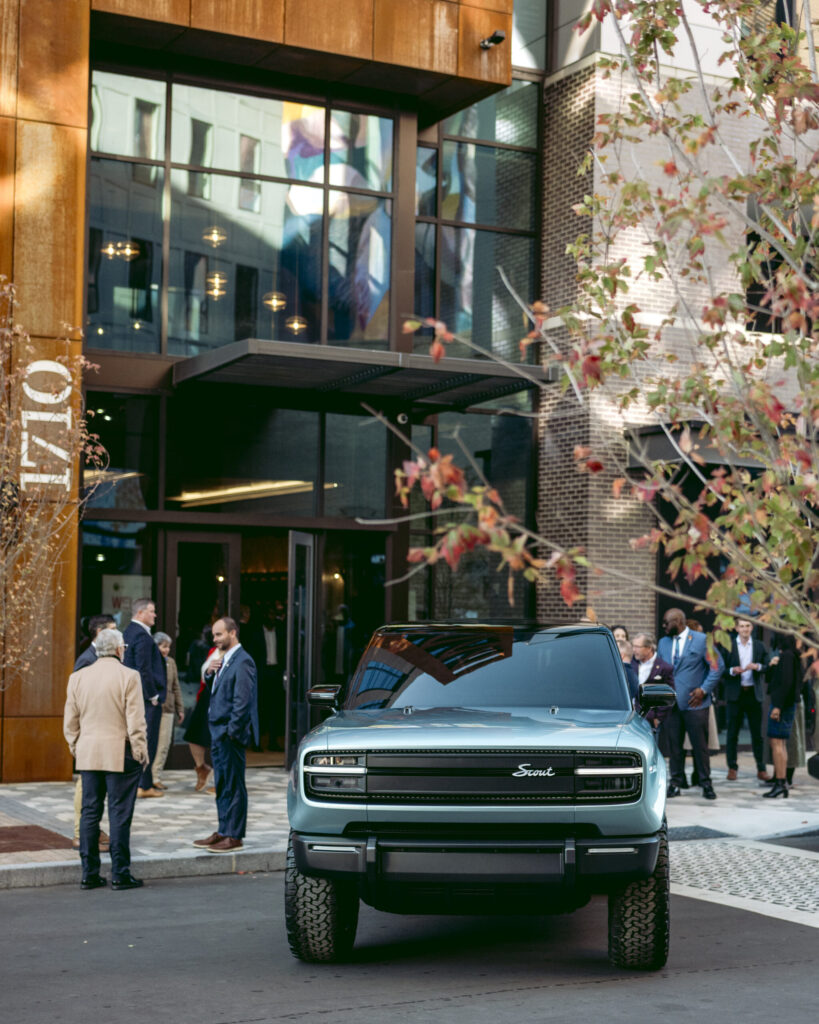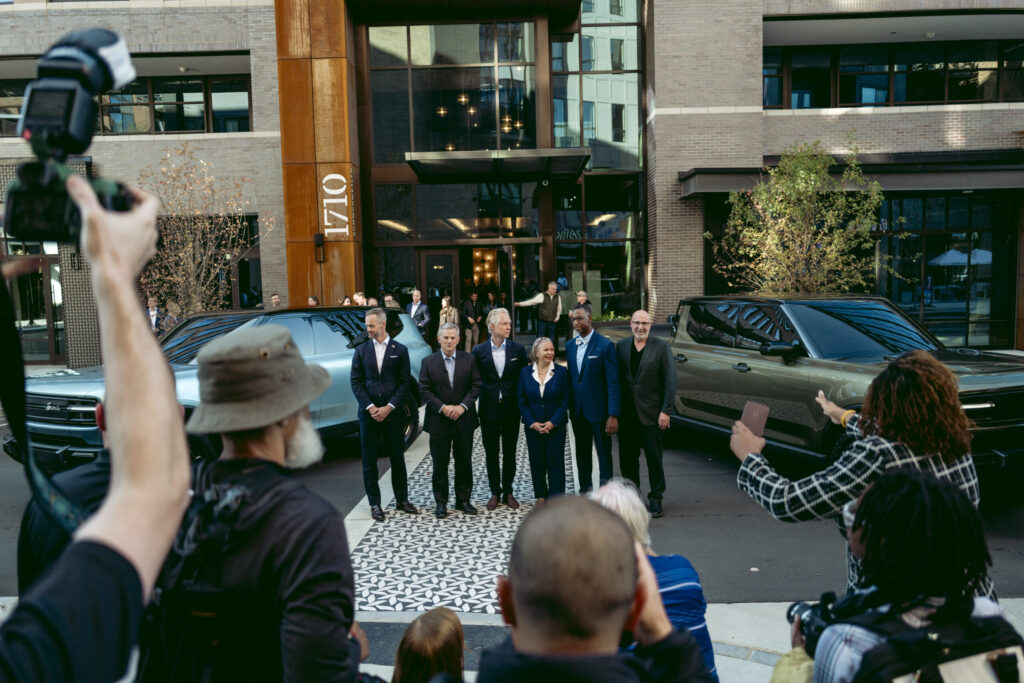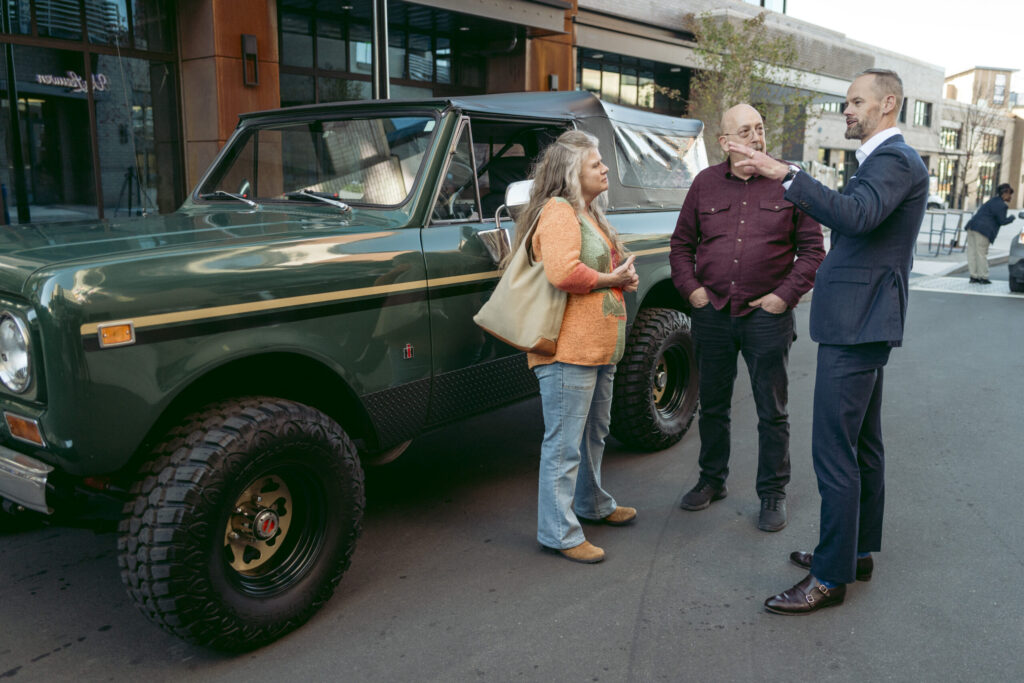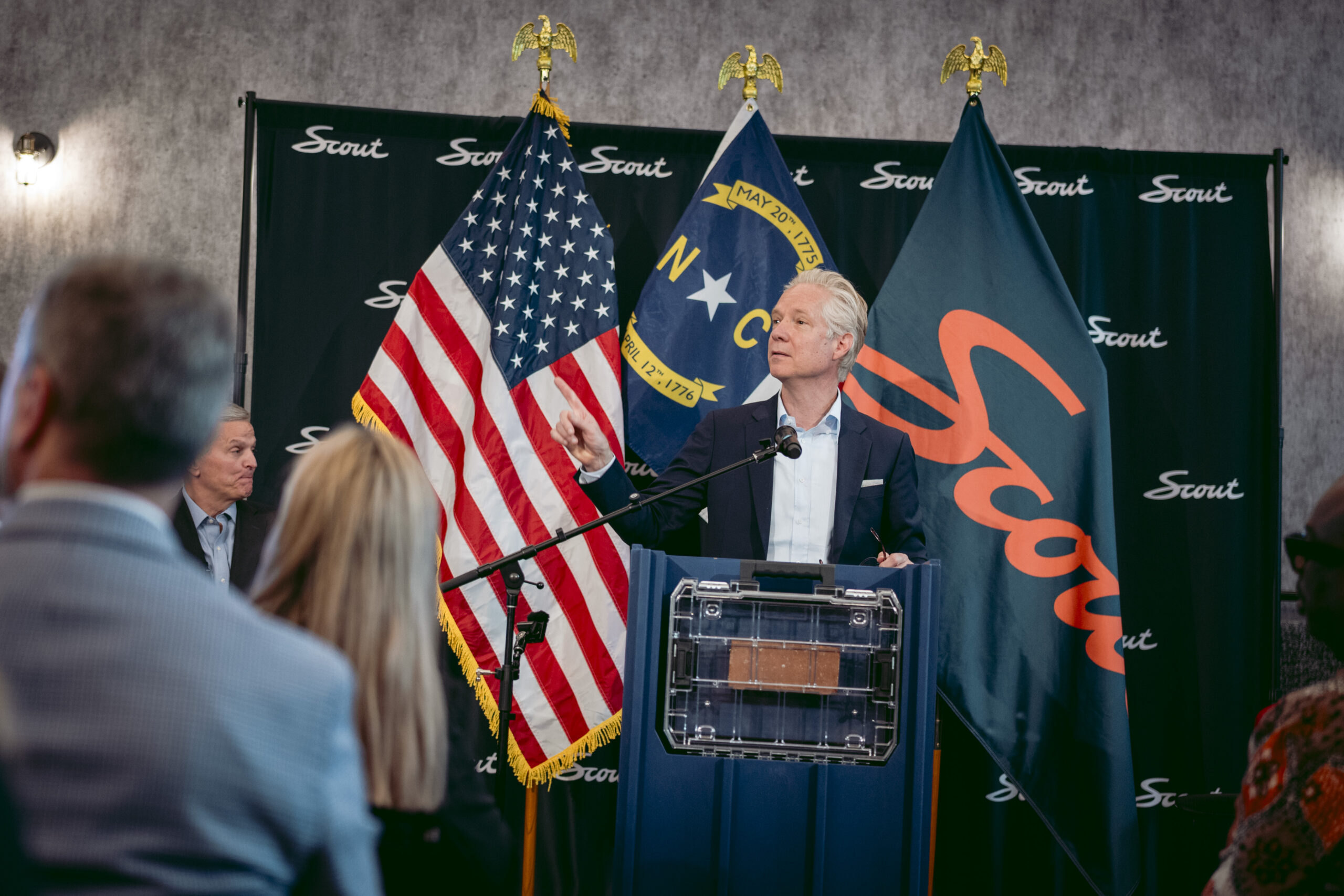Scott Keogh had done the red-carpet tour of Charlotte. He’d heard the pitches and presentations telling him why his throwback startup, Scout Motors, should plant its headquarters here. But he was looking for something that wasn’t in the pages or promises. He was looking for, in his words, a vibe.
Scout was one of the most sought-after brands in search of an HQ home this year. In the haze of tech ventures and financial firms expanding and relocating, here was a company that makes something people can touch.
Many North Carolinians — especially farmers who were loyal to the “red tractor” International Harvester over a certain green tractor rival — owned Scout’s all-terrain SUVs in the 1960s and ’70s. The trucks were discontinued in 1980, a sedan-heavy era when the Oldsmobile Cutlass was America’s most popular car. Over time, the Scout became more than a vehicle; it became a memory. Of first dates. Of Sunday drives with an old dog on the bench seat. Of jittery trips home from the hospital with a newborn.
In 2022, when Keogh announced plans to resurrect Scout as a modern electric vehicle with the muscle of the old models, online forums lit up. The company ballooned from two employees to about a thousand in just three years. Another 4,000 jobs are planned for an under-construction production facility near Columbia, South Carolina. Now it needed a home base.
Charlotte was one of many suitors. Keogh had seen all of their best sides. So about a year ago, he decided to take an off-radar trip to Charlotte, without tour guides.
He went to the site on Central Avenue he’d been considering, home of the new Commonwealth development. He wandered the neighborhood, past the guitar studio and shoe shop and tattoo parlor. Then he stumbled upon Calle Sol, a Latin restaurant in the old Penguin burger joint.
Keogh, as it happens, loves ceviche. And after a few bites, the vibe clicked.
“I liked it because it was unscripted,” he told me last week. “We literally just parked the car and we walked. … You move from, ‘I’m on a business trip’ into [trying] to visualize being here walking these streets.”
On Wednesday, Keogh was back at the Commonwealth, standing with Governor Josh Stein and a crowd of local and state officials to announce that Scout will bring its headquarters and 1,200 jobs to Plaza Midwood. Keogh and Stein rolled up in an old Scout. Out front sat prototypes of the new electric versions, expected to be released in 2027.
“People look at these decisions and they check a box, and they talk about things like, what’s the cost of living and what’s the cost of housing, and what about education?” Keogh told the crowd. “Those are powerful things. But of course, at the end of the day, it needs to be a home.”


Charlotte’s had a big year for economic development announcements, usually delivered through press releases that reduce the complex decisions to a string of numbers: jobs (here, roughly 1,200), average salary (about $173,000), tax incentives (roughly $72 million in state and local support), and lofty economic projections (the state says Scout could grow North Carolina’s economy by nearly $5 billion).
Behind those headlines, though, is a far more delicate and intricate dance.
Charlotte’s pitch has matured significantly in the last decade. Gone is the cheeky Amazon HQ-style pandering of the late 2010s. Gone, too, are the days when the city would court any company — say, Chiquita — only to watch them vanish a few years later.
The region no longer begs companies to be interested; instead the goal is to ensure that they fit, and stay. The Charlotte Regional Business Alliance builds itineraries for site visits designed to show cohesion, bringing in leaders from the county, city, state, higher education, K-12, and executives from companies that have recently made the leap.
Scout’s team gave me several hours this past week to walk me through why Charlotte won. And yes, apologies to Calle Sol owner Frank Scibelli, it’s about far more than ceviche.
It came down to available workforce talent, the airport, the Commonwealth site, the universities and community colleges that graduate new engineers in the automotive industry each year, quality of life, and incentives. It also wasn’t just about whether Scout’s current employees would be happy here, but whether the market had plenty of job opportunities for “trailing spouses.”
In every other market Scout considered, “you almost inevitably, at the end, feel like you’re having to make some huge trade-off,” Ryan Rose, Scout’s vice president of administration, told me. “Charlotte sort of brought a holistic, right kind of approach, where we felt good, across the board.”


Four years ago, the old strip mall on Central was most famous for being a place where many of us got our first Charlotte parking ticket.
The “No Public Parking” sign along the street was deemed part of the neighborhood’s middle-finger charm. When developer Crosland Southeast and Nuveen Real Estate announced plans in 2021 to redevelop the 12 acres, locals bowed up: Don’t park your new buildings here.
Demolition of old-standbys like Sammy’s Deli and Elizabeth Billiards made folks misty. The first phase of construction was a hulking concrete parking deck, which didn’t help matters. Rooftop bar-goers were livid that the box blocked their skyline view. My brother works for the concrete company that built it, and he spent a few weeks in the doghouse of a group chat with our mutual friends.
Charlotte is primed to sulk about how it tears down its history, even when that history is mostly asphalt.
Today, apartments with balconies wrap the parking deck. Two century-old buildings remain. One’s been renovated already and will become home to the James Beard-winning sushi spot Uchi. In the new development, there’s a boot store and a Warby Parker. A Sweetgreen is on the way. The final big piece was an office anchor.
“We want the 5Ks to start and end here; we want the farmers markets here,” Crosland Southeast vice president Bobby Speir told me. “We designed this to be an active member of the community. Hopefully when we get done, people will be like, ‘OK, I get it, there’s something for me here.’”
The strip had a history, long before the parking lot years. Cole Manufacturing Company produced seed planters for local farmers here in the early 1900s. It later expanded to include other farm equipment and supplies, and stayed there for 80 years.
The agriculture and manufacturing roots connected with Keogh who considers himself a “nostalgic romantic.” The parallels to Scout’s story appealed to him.

International Harvester produced the original Scouts from 1961 to 1980. Only about 1 percent of the cars on America’s roads were SUVs at the time, Scout public affairs director Jamie Lovegrove told me. The models were discontinued, and the Indiana plant shuttered.
International Harvester’s truck and engine business eventually became Navistar, which Volkswagen’s Traton Group acquired in 2021. Buried in the sale contract were lines about the Scout brand and name.
Keogh was then president and CEO of Volkswagen Group of America. The story goes that he saw the brand in the fine print and felt that romantic ping. He and others proposed reviving it as a separate VW subsidiary, with rugged electric Scouts sold directly to consumers. They worked on a “range-extender” technology that uses an onboard gas-powered generator to recharge the batteries mid-drive and push the total range to about 500 miles.
“The idea, obviously, is not just to bring back a relic, but bring back a revolution and bring back getting America back to manufacturing things, dreaming things, and doing things again,” he said Wednesday.
That vision, he said, fit neatly with what Crosland Southeast had in mind for the Commonwealth development. Keogh compared the surrounding neighborhood to places he knew growing up in New York, like Brooklyn and Queens.
“I mean that totally complimentary way, in that you have tons of diversity of structures,” he told me. “Everything’s not one big cookie cutter type of thing, which I’m not a fan of. And you have people who are trying things. You can sense who’s opening stores and who’s bringing life. So it’s got a lot of this grit and initiative and spontaneity and spirit, and all the things that I like.”


On the official visit, Scout’s executives were struck by the lineup of meetings.
Meredith Manz, chief human resources officer, remembers talking with representatives from CMS, UNC Charlotte, CPCC, Roush racing, Allen Tate (now Howard Hanna Allen Tate), and executives from other recently relocated companies like Honeywell.
“You really felt wanted,” she said. “They were all singing the same sheet of music, but it wasn’t artificial.”
Manz moved to Waxhaw three years ago, and she’ll be in charge of hiring hundreds of employees to fill out the Plaza Midwood HQ. After Wednesday’s announcement, several “Scouts,” as they call employees, messaged her to say they were ready to move to Charlotte immediately.
Manz will be the first in-office employee, and she expects to be at a desk in January 2026. Scout’s already changed its “remote” job listings to “Charlotte” job listings.
UNC Charlotte and CPCC will be especially important. UNCC’s motorsports engineering program graduates about 50 new students per year, and more than 20 percent of NASCAR Cup Series engineers graduated from the school, William States Lee College of Engineering Dean Rob Keynton told me.
Keynton and I talked about the larger history of automobiles. Of course, Detroit fueled the first wave in the 1900s, with the Ford family. Then came the first electric-vehicle wave centered on the tech companies in California. Now, with Toyota’s recently opened battery-making plant in Randolph County, VinFast’s planned facility in Chatham County, and Scout’s production facility in South Carolina, the Carolinas are becoming a next hub of American automaking.
“We see a lot of companies moving to this area,” Keynton said. “Given the transportation capabilities that we have here too. The airport, the closeness to the ocean and the seaports. All of that combined helps make this a great place for them.”
Of course, not everyone is thrilled with Scout’s precise location. South Carolina commenters fired off in the news post from The State newspaper, asking why Columbia wasn’t the new home. One outlet said that Scout “stiffed” that state, calling it a “humiliation” for current S.C. Gov. Henry McMaster.
Rose, Scout’s vice president, tried to temper that. He said most of the suitors would’ve been good homes, but that Charlotte simply felt right. He’s from Indiana originally, and he compared this region’s recruitment machine to the chemistry of a college basketball team that’s stayed together for four years.
“By that fourth year, they knew exactly what the other one was going to do, because they played together for years, and they knew exactly who was going to pass to who and where to be,” he said. “You get in front of that team in Charlotte and North Carolina, you’re like, ‘This is a team that knows how to play together,’ and your confidence level goes up.”


Lee Lilley grew up in a “red-tractor” family out in Williamston in far eastern North Carolina. His family owned a farm machinery business. He says he came home from the hospital as a newborn in an old Scout SUV, and he showed me a handful of pictures of himself as a child with the vehicle.
Now, as secretary of commerce, Lilley’s been central to the state-incentivized announcements this year. North Carolina authorized about $46 million million in Job Development Investment Grant reimbursements for Scout, and state documents put the overall economic impact at roughly $4.8 billion. The city and county governments will add about $21 million, as the Charlotte Business Journal’s Eric Spanberg wrote. The incentives will be disbursed over the next 12 years, as long as Scout hits its hiring goals. In turn, Scout will invest $206.9 million into the project, according to official estimates.
Lilley sees the investments a level deeper than tax breaks. He’s seen firsthand how one job can lead to the next — like say, how growing up in a farm-equipment business can one day lead to someone becoming the secretary of commerce. Having a company that will employ young professionals helps solve a major problem at a time when AI is vacuuming up entry-level positions.
“The people who work here are going to go start other businesses in Charlotte,” Lilley told me. “That’s what’s interesting, the spinoff effect.”
Still, concerns over housing and affordability loom, and each influx of highly-paid workers puts a strain on disadvantaged communities throughout the city.
“We’ve been on a run lately like we haven’t seen in a long time,” county commissioner Arthur Griffin told me on Thursday. “If you’re prepared for these jobs, it’s great for you. If you’re not, things will be tough.” Griffin added, though, that new residents with disposable income can create jobs in local restaurants and shops and services.
And if you happen to be working at a restaurant in Plaza Midwood in a couple of years, you’ll probably run into Keogh.
After Wednesday’s announcement, Optimist photographer Logan Cyrus and I walked to Legion Brewing on Commonwealth to talk out coverage plans. We sat inside.
When we walked out to leave, Keogh was sitting at a picnic table with his team, celebratory beers in hand, at a brewery that used to be a sheet-music factory.
We waved, and he hollered back, “Found another spot!”
Editor’s notes: We corrected this story to show that Meredith Manz is Scout’s chief human resources officer, not human resources director.
We also corrected it to say that the UNC Charlotte Dean of Engineering is Rob Keynton, not Dean Emeritus Robert Johnson.
